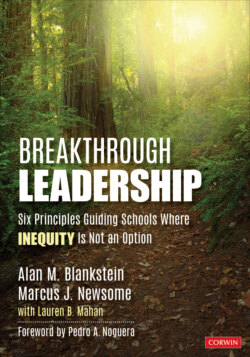Читать книгу Breakthrough Leadership - Alan M. Blankstein - Страница 15
На сайте Литреса книга снята с продажи.
A New Way Forward: Breakthrough Leadership
ОглавлениеOur choices are clear. As a nation, continent, and world, we can turn a collective blind eye to the interconnected equity issues that COVID-19 and the blatant murder of our citizens of color lay bare, or use our understanding of these issues to make a better and more equitable society. The breakthrough leadership model is rooted in the principles of courage, and is consistent with, but not reliant on, adaptive leadership, which is focused on innovating to address emerging challenges. At the root of breakthrough leadership, however, is a fundamental shift in perspective regarding the root cause of the challenge at hand, the solution to which is a new set of actions that often require going beyond one’s current “boundaries.” Whereas adaptive leadership might lead a team to mobilize in finding and delivering meals to homeless students and families, breakthrough leadership would in addition call for a deeper analysis to determine why they were homeless in the first place, and what set of alliances, resources, and common understandings and commitments are necessary to address this issue at its root, definitively and systemically. Both are rooted in courage, as indicated below.
This COVID-19 and civil rights crisis calls for the kind of breakthrough leadership described in Chapter 2. The viral breakout and civil unrest have led to a breakdown, which in turn can become a breakthrough for our collective commitment to a new level of equity.
Adaptive and courageous leadership at all levels is now becoming the norm in assisting and educating children during this pandemic. Next, we are called on to understand and to change the underlying conditions that have led to a secondary crisis for our children that may far surpass the toll taken by the virus itself. At the heart of this leadership is an unflinching and profound look at the needs of our children and their families, and a steadfast commitment to actions to change the conditions accordingly.
Figure 1.1 Breakthrough Leadership
By contrast, in the Spanish flu example, the Allied forces were seen as expendable, and their well-being was sacrificed by their leadership to further other priorities. Moreover, the truth of the pandemic underway was hidden to the detriment of these same soldiers, and up to fifty million other victims, ultimately including the commander-in-chief, President Wilson.
Similarly, consider the news, as reported to NPR by Jim Zarroli on April 13, 2020, that “a Smithfield Foods plant in Sioux Falls . . . has become the latest meat processing facility to shut down as COVID-19 sickens plant workers.” Zarroli reports that “one of the country’s largest pork-producing plants closed indefinitely after nearly 300 of its employees tested positive for COVID-19. And the company’s CEO warned that the coronavirus pandemic is pushing the nation’s meat supply ‘perilously close’ to the edge.”
The backstory of this closure, and many more to come, is the poor and unclean working conditions of this company’s impoverished workforce. As we write this chapter, another plant in Iowa is closing down (Jackson, 2020). The employees, in turn, haven’t enough funds or health insurance coverage to forgo a day’s or week’s pay. Working, and thereby chancing infection of their colleagues, seems the only way forward for these employees (Grabell, 2020).
The “smallest cog” has led to the closure of one of the largest and oldest meatpacking companies worldwide, which in turn affects the entire supply chain and availability of food for us all. If we don’t pay attention to the health, education, and well-being of the least among us, even the most powerful will be affected:
We are dependent on one another. Some feel they can escape COVID-19, but they can’t escape destruction of our planet. Impacts of climate change were already dictating movements of people. Maybe some have a fantasy that they will pay their way on a rocket ship. We always were codependent as humans, and locking down Florida doesn’t mean they can escape that. It isn’t the “others” that are the problem. It further highlights our interdependence. (David Osher, personal communication, April 1, 2020)
